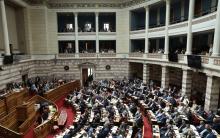Democracy
GPO Poll: ND leads by 20.5 points for the European elections – SYRIZA comes second
New Democracy secures 34.8% in the estimated vote share with valid votes accounted for
It’s up to US voters now
Citizens are democracy's first and last line of defense. Institutions are shaped to anticipate problems and prevent deadlock, to regulate the state's functions, to protect the weak and check the powerful. In the end, though, it is citizens who determine the country's course, based on their interests - or, rather, on what they perceive their interests to be at that time.
- Read more about It’s up to US voters now
- Log in to post comments
A stubborn chasm
One of the significant deficiencies in the 50-year-old democracy established after the military dictatorship in Greece, in comparison to our European counterparts, is its failure to secure equal participation of women in political and economic spheres.
- Read more about A stubborn chasm
- Log in to post comments
A conference of reflection
It's one of those times when the final result exceeds expectations. The three-day conference that Kathimerini organized last week, along with the National Bank Cultural Foundation, Delphi Economic Forum, and the Hellenic Observatory at the LSE's European Institute, on 50 years since the restoration of democracy in Greece, to a large degree ended up being what we all hoped for.
- Read more about A conference of reflection
- Log in to post comments
For younger Greeks, democracy is not all it’s cracked up to be
The quality of the democracy achieved during the Metapolitefsi era, its institutional and financial performance, is held in much lower esteem by younger generations than older Greeks, a new poll has found.
The power of dialogue
The discussions held last week at the conference commemorating the 50th anniversary of the restoration of Greek democracy organized, among others, by Kathimerini, showed that the country's political system can also articulate a reflective discourse that goes beyond the narrow limits of party confrontations.
- Read more about The power of dialogue
- Log in to post comments
Lessons from the Metapolitefsi
Is Greece's transition to democracy, a historical process known as the "Metapolitefsi," complete? What are the legacies and hangups left behind, 50 years after the collapse of the military dictatorship? The debate on these and many more questions has started, and it needs to carry on, if for no other reason than to separate myth from reality.
- Read more about Lessons from the Metapolitefsi
- Log in to post comments
Greeks want more women and technocrats in politics
Greeks have revised their view regarding technocratic governments, according to a Pew Institute poll of 24 nations for 2023, which found that support for expert cabinet members in Greece climbed by 25% in the last five years.
At the same time, citizens want more women, young people, and religious people in politics, as they have lost faith in the current political leadership.
- Read more about Greeks want more women and technocrats in politics
- Log in to post comments
The day after and the alienation of conservative voters
The successful passage of the bill legalizing same-sex marriage brought relief to the government as the measure had created internal divisions and has left scars in New Democracy with one third of the party's deputies not voting for the law in Parliament.
Is global democracy on the ballot in 2024? What’s at stake for the US and Greece
2024 will see billions of people head to the polls, including in the US, and many have asked if global democracy is on the ballot.









